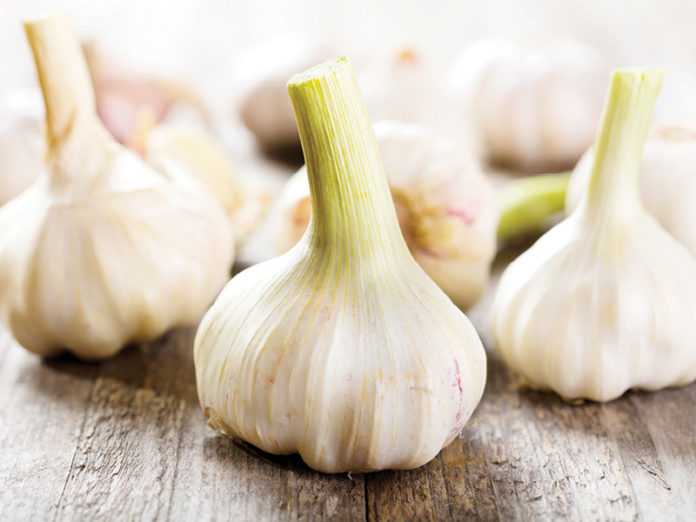
Used in countless recipes, garlic (Allium sativum L.) may be one of the oldest-known superfoods ever with written references dating back to 6,000 B.C.
Greek Olympians were said to have eaten garlic to help build their stamina. Ancient Indian and Chinese medicine suggested garlic for a variety of ailments including intestinal problems, respiratory illnesses and parasitic infection. But does this ancient wisdom still hold true today under scientific scrutiny?
According to Dr. Josh Axe an author, nutritionist and doctor of natural medicine, garlic contains “countless vital nutrients – flavonoids, oligosaccharides, amino acids, allicin and high levels of sulfur…” He also points out that “Garlic… ranks only second to turmeric… in the amount of research backing this superfood.” More than 5,100 peer-reviewed articles have evaluated the benefits of garlic. Overall, most of them agree there are modest benefits to eating raw garlic, but there is dissension out there too.
One of the key components garlic is allicin. This compound is responsible for garlic’s strong taste and smell. Berkeley Wellness, a leading online resource for evidence-based wellness information explains that not all scientists agree allicin is the main beneficial ingredient. “In fact, no one knows which, if any, component is the most important; different ones may have different effects on the body.”
A well-respected study at Stanford University in 2007, showed no benefit to taking garlic for reducing cholesterol. But it does have other benefits.
Dr. Michael Greger, author, physician and creator of the Nutrition Facts website, is a fan of garlic. He says it helps reduce stiffness in the arteries to the heart, which occurs naturally as we age. “Those who consume garlic – less than a quarter teaspoon of garlic powder per day – appear to have less stiffness in their arteries. “We think this is because garlic seems to improve the function of the inner lining of our arteries which helps our arteries relax.”
Garlic can also have other positive effects on your heart. A 2016 randomized, double-blind study in 2016 by the Journal of Nutrition showed that aged garlic extract helped reduce plaque in cardiac arteries for patients with metabolic syndrome. It also helped prevent the formation of new plaque, leading researchers to conclude that aged garlic extract can slow development of atherosclerosis and reverse the early stages of heart disease.
A related benefit is garlic’s role in helping reduce blood pressure, the number one factor in causing strokes. Garlic is widely used in developing countries as a treatment for high blood pressure and several small, short-term clinical studies have shown garlic to reduce blood pressure in patients with hypertension. Unfortunately, a standardized dosage has not been identified.
There is less evidence showing garlic having a beneficial impact on cancer. According to Berkeley Wellness “Some, but not all, population studies have found that people who eat a lot of garlic have a lower risk of certain cancers. But there have been few large, long-term randomized trials, which are needed to prove that it’s really garlic, and not something else about garlic eaters, that affects cancer risk.”
Some studies have shown a link between cancers of the stomach, esophagus, colon, pancreas and breast and increased garlic consumption. Researchers speculate that garlic’s antibacterial properties or its ability to block cancer-causing substances may halt the activation of cancer. It has been found to contain a large number of potent compounds with anti-cancer properties, mainly allylsulfide derivatives. Although more research is needed it is clear there is some potential in garlic as a cancer-fighting food.
“To make the most of garlic’s active compounds, it’s best to either consume garlic raw or to crush/cut it and leave it out for a bit (10 minutes) before you add it to your cooked recipes,” says Dr. Axe.
While garlic has been shown to have a modest, positive effect on health, it should not replace medications. It may also interact with prescription drugs and these impacts have not been studied. As always, check with your doctor before adding garlic or any other supplements to your diet.















